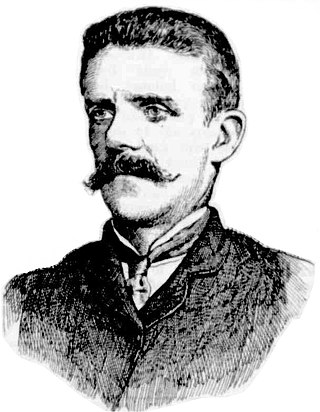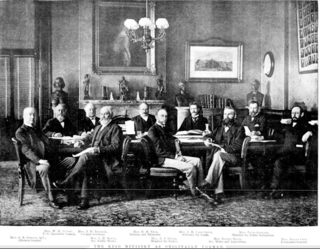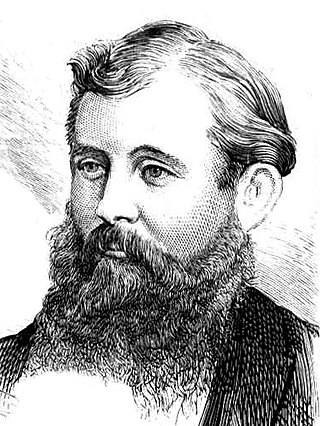Related Research Articles

Sir Joseph Palmer Abbott, was an Australian politician, pastoralist and solicitor.
This is a list of members of the New South Wales Legislative Assembly who served in the 16th parliament of New South Wales from 1894 to 1895 They were elected at the 1894 colonial election on 17 July 1894. The Speaker was Sir Joseph Palmer Abbott.
The Protestant Independent Labour Party, alternatively spelt Protestant Independent Labor, was a minor Australian political party that operated mainly in New South Wales, Queensland and South Australia in the 1920s and 1930s. It was formed by Walter Skelton in July 1923 as the Protestant Independent Labour Party. who had stood for the New South Wales Legislative Assembly district of Newcastle at the 1922 election, campaigning as a Protestant Independent Labour candidate, in which he was elected first of five members, receiving 25.19% of the vote. In 1925 he was re-elected to the Assembly under the Protestant Labour label, as the second of five members, receiving 17.70% of the vote. The party stood candidates in 12 of the 24 districts however Skelton was the only one elected, with the next highest candidate receiving 5.10% of the district vote.
Members of the New South Wales Legislative Assembly who served in the 14th parliament of New South Wales held their seats from 1889 to 1891. They were elected at the 1889 colonial election between 1 and 16 February 1889. The Speaker was James Young until 21 October 1890 and then Joseph Palmer Abbott.

Alfred Edden was a politician, trade union organiser and coal miner in New South Wales, Australia. He was a member of the New South Wales Legislative Assembly for more than 28 years, including 3 as Secretary for Mines. He was a foundation member of the Labor Party but left the party twice, in 1891 over the question of the solidarity pledge and was expelled in 1916 over the question of conscription.
Balmain, an electoral district of the Legislative Assembly in the Australian state of New South Wales, has had three incarnations since it was established in 1880. It expanded from 1 to 2 to 3 to 4 members before being abolished in 1894. It was re-established in 1904 returning 1 member until 1920. When multiple member constituencies were established using the Hare-Clark single transferable vote in 1920, Balmain returned 5 members. It had a single member from 1927 when the state returned to single member electorates. It was abolished in 1991 and largely replaced by Port Jackson which included the Sydney CBD. It was re-established in 2007 when Port Jackson was abolished.

The Reid ministry was the 28th ministry of the Colony of New South Wales, and was led by the 12th Premier, George Reid. The title of Premier was widely used to refer to the Leader of Government, but was not a formal position in the government until 1920. Instead the Premier was appointed to another portfolio, usually Colonial Secretary but on this occasion Reid took the portfolio of Colonial Treasurer until July 1899 and then Attorney General.

John Daniel FitzGerald was a politician, union official, journalist and barrister in New South Wales, Australia.
Patrick Joseph Minahan, was an Irish-born Australian politician.
Ellison Wentworth Quirk was a New South Wales politician, Alderman and member of the New South Wales Legislative Assembly, representing the electorate of Warringah from 1901 to 1904.

John Fitzgerald Burns was an Australian politician, member of the Parliament of New South Wales, Postmaster-General in the 1870s and Colonial Treasurer in the 1880s.

The 1891 New South Wales colonial election was held in the then colony of New South Wales between 17 June to 3 July 1891. This election was for all of the 141 seats in the New South Wales Legislative Assembly and it was conducted in 35 single-member constituencies, 20 2-member constituencies, 10 3-member constituencies and nine 4-member constituencies, all with a first past the post system. Part 1 of the Electoral Act of 1880 set the qualification for election on "every male subject of Her Majesty of the full age of twenty-one years and absolutely free being a natural born or naturalized subject". Seven seats were uncontested. The previous parliament of New South Wales was dissolved on 6 June 1891 by the Governor, The Earl of Jersey, on the advice of the Premier, Sir Henry Parkes.

Hugh Langwell was an Irish-born politician, trade unionist and public servant in New South Wales, Australia. He was a member of the New South Wales Legislative Assembly, Legislative Council, Amalgamated Shearers Union, Western Lands Board and Lord Howe Island Board of Control.
The 1894 New South Wales colonial election was for 125 electoral districts, with each district returning one member. The election was conducted on the basis of a simple majority or first-past-the-post voting system. There were three significant changes from the 1891 election, the abolition of multi-member constituencies, the abolition of plural voting where an elector had property or residence in more than one electorate and that polls for every district were held on the same day. The number of seats was reduced from 141 to 125. In this election, in 74 electorates the winning candidate received less than 50% of the votes, while 1 was uncontested. The average number of enrolled voters per electorate was 2,046, ranging from Lismore (1,360) to Marrickville (2,924).
Kahibah, an electoral district of the Legislative Assembly in the Australian state of New South Wales, has had three incarnations, the first from 1894 to 1920, the second from 1927 to 1930 and the third from 1950 to 1971.
Namoi, an electoral district of the Legislative Assembly in the Australian state of New South Wales had two incarnations, from 1880 to 1894 and from 1904 to 1950.
Bourke, an electoral district of the Legislative Assembly in the Australian state of New South Wales was created in 1880 and abolished in 1904.
Grenfell, an electoral district of the Legislative Assembly in the Australian state of New South Wales was created in 1880 and abolished in 1904.
A by-election for the seat of Hartley in the New South Wales Legislative Assembly was held on 14 August 1894 because Joseph Cook had been appointed Postmaster General in the Reid ministry. Such ministerial by-elections were usually uncontested and four ministers were re-elected unopposed, James Brunker, Joseph Carruthers, Jacob Garrard (Sherbrooke) and James Young. A poll was required in Bathurst, Hartley, Singleton and Sydney-King however all were comfortably re-elected.
Wentworth, an electoral district of the Legislative Assembly in the Australian state of New South Wales, was created in 1859 and abolished in 1904.
References
- ↑ Green, Antony. "Results of the 1891 colonial election". New South Wales Election Results 1856-2007. Parliament of New South Wales . Retrieved 6 May 2020.
- ↑ "Part 5B - Members returned for each electorate" (PDF). New South Wales Parliamentary Record. Parliament of New South Wales . Retrieved 20 April 2020.
- ↑ "Former Members". Parliament of New South Wales . Retrieved 20 April 2020.
- ↑ Green, Antony. "1891 Wentworth". New South Wales Election Results 1856-2007. Parliament of New South Wales . Retrieved 12 April 2020.
- ↑ Green, Antony. "Results of 1891–94 by-elections". New South Wales Election Results 1856-2007. Parliament of New South Wales . Retrieved 6 May 2020.
